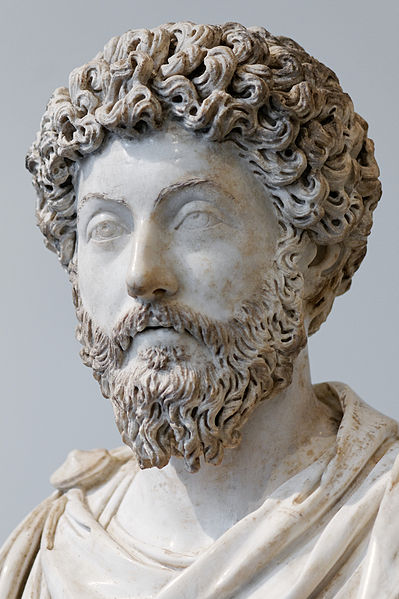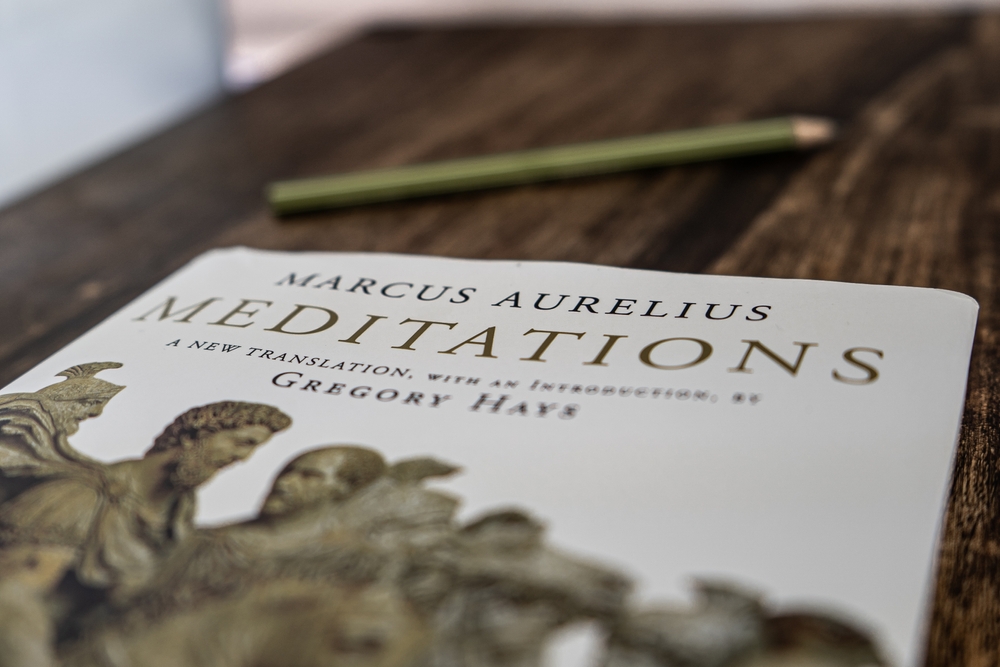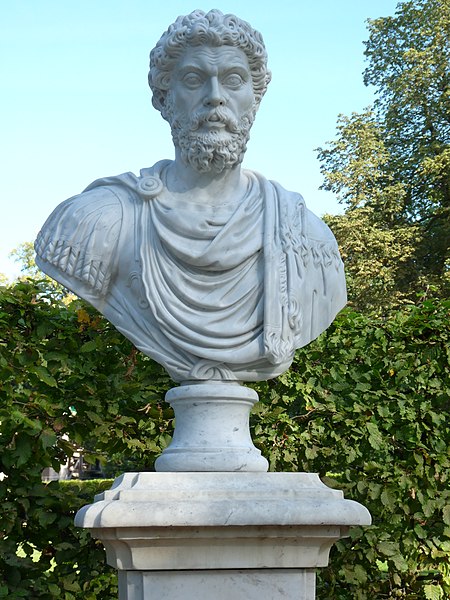Marcus Aurelius (121-180 AD) was a Roman Emperor, philosopher, and author. Born in Rome, he came from a prominent family and became emperor in 161 AD after the death of his adoptive father, Antoninus Pius.
Marcus Aurelius is renowned for his philosophical works, particularly “Meditations,” which he wrote for personal reflection and guidance. Influenced by Stoicism, he sought to live a life of virtue, reason, and self-discipline. As emperor, he faced military campaigns and challenges, including the Parthian War and the Marcomannic Wars.
Despite his philosophical inclinations, he has faced criticism for his involvement in the persecution of Christians. Marcus Aurelius is considered one of the “Five Good Emperors,” but his reign marked the beginning of a decline for the Roman Empire.
He died in 180 AD, leaving a lasting legacy through his writings and philosophical insights.
Marcus Aurelius Facts
1. Marcus Aurelius was born on April 26, 121 AD, in Rome, Italy
Marcus Aurelius was born on April 26, 121 AD, in Rome, Italy. He came from a prestigious Roman family with a lineage that could be traced back to Numa Pompilius, the second king of Rome. His family was well-connected and held high positions in the Roman government and society.

2. He became the Roman Emperor in 161 AD
Marcus Aurelius ascended to the Roman imperial throne in 161 AD. This happened after the death of his adoptive father, Emperor Antoninus Pius.
Also Read: Marcus Aurelius Accomplishments
Antoninus Pius had chosen Marcus Aurelius as his successor, adopting him as his son and giving him the name Marcus Aelius Aurelius Verus. The adoption took place when Marcus Aurelius was just 17 years old.
3. Marcus Aurelius is best known for his philosophical works, particularly his collection of writings called “Meditations”
Marcus Aurelius is best remembered for his philosophical works, particularly his collection of writings known as “Meditations” (in Greek, “Ta eis heauton” or “Thoughts to Myself”).
The Meditations are a compilation of personal reflections and philosophical insights that Marcus Aurelius wrote primarily for his own guidance and self-improvement.
They were not intended for publication during his lifetime but were instead a private journal of philosophical musings. The book explores themes of ethics, self-discipline, virtue, and the transience of life.
Also Read: Antoninus Pius Accomplishments
Marcus Aurelius often turned to his writings as a means of self-reflection and as a reminder of the Stoic principles he sought to embody. It is believed that he wrote the Meditations during his military campaigns and in moments of solitude, contemplating the challenges and responsibilities of his role as emperor.
The book provides valuable insights into his inner thoughts, struggles, and aspirations as a philosopher-king.

4. As emperor, Marcus Aurelius faced numerous military campaigns and challenges to the Roman Empire
As the Roman Emperor, Marcus Aurelius faced various military campaigns and challenges throughout his reign. One of the significant conflicts was the Parthian War, which began in 161 AD shortly after he assumed the throne.
The war aimed to regain territories lost by the Romans to the Parthian Empire. Marcus Aurelius appointed his co-emperor, Lucius Verus, to lead the campaign. The Romans achieved some successes, but the war ultimately ended inconclusively due to internal conflicts within the Parthian Empire.
5. He is often referred to as the last of the “Five Good Emperors”
Marcus Aurelius is often celebrated as one of the “Five Good Emperors” of Rome. This group includes Nerva, Trajan, Hadrian, Antoninus Pius, and Marcus Aurelius.
The term “Five Good Emperors” refers to a period of relative stability, competent governance, and prosperity in the Roman Empire from 96 to 180 AD. These emperors were known for their fair rule, respect for the Senate, and wise administration.
6. Marcus Aurelius was heavily influenced by Stoic philosophy and sought to live a life guided by its principles
Marcus Aurelius was deeply influenced by Stoic philosophy, particularly the teachings of Epictetus and the Stoic philosopher-emperor, Seneca. He studied Stoic principles and sought to incorporate them into his personal and public life.
Stoicism emphasizes the importance of reason, virtue, and self-control in achieving inner tranquility and moral excellence. Marcus Aurelius believed in living in accordance with nature, accepting the impermanence of life, and maintaining a steadfast commitment to justice, wisdom, and temperance.

7. Despite his philosophical inclinations, Marcus Aurelius faced criticism for his involvement in the persecution of Christians
Despite his philosophical leanings, Marcus Aurelius has faced criticism for his involvement in the persecution of Christians during his reign. At the time, Christianity was growing as a religious movement, and its followers faced sporadic persecution throughout the Roman Empire.
While there is evidence of persecution occurring under Marcus Aurelius, the extent of his personal involvement and the motivations behind it remain debated among historians.
It is worth noting that the Christian community was not the primary target of his policies, and other factors, such as social unrest and political considerations, likely influenced the persecution.
8. Marcus Aurelius had a co-emperor named Lucius Verus, who ruled alongside him from 161 until Verus’ death in 169 AD
Marcus Aurelius ruled alongside his adoptive brother and brother-in-law, Lucius Verus, as co-emperors. Verus was adopted into the imperial family by Antoninus Pius and became co-emperor with Marcus Aurelius in 161 AD.
They shared power until Verus’ death in 169 AD. Lucius Verus contributed to the Roman military campaigns against the Parthian Empire and played a significant role in the Marcomannic Wars against Germanic tribes.
However, Verus is often overshadowed by Marcus Aurelius in historical accounts, as the latter’s reign and philosophical writings have had a more lasting impact.
9. During his reign, Marcus Aurelius dealt with the Antonine Plague, also known as the “Plague of Galen”
During Marcus Aurelius’ reign, the Roman Empire experienced the devastating Antonine Plague, also known as the “Plague of Galen.” This pandemic, believed to be caused by either smallpox or measles, began around 165 AD and lasted for about 15 years.
It resulted in widespread illness, death, and social disruption throughout the empire. Marcus Aurelius and his co-emperor, Lucius Verus, were personally affected by the plague, with Verus reportedly succumbing to the disease in 169 AD.
10. He is known for his military campaigns against Germanic tribes, particularly the Marcomanni and Quadi
One of the notable military campaigns led by Marcus Aurelius was the Marcomannic Wars, fought against Germanic tribes along the northern borders of the Roman Empire. The wars were prompted by invasions and incursions by the Marcomanni, Quadi, and other Germanic tribes from 166 to 180 AD.
Marcus Aurelius personally commanded the Roman legions during these conflicts, spending several years on the front lines. The wars were arduous and prolonged, with the Roman Empire ultimately achieving some victories but also facing setbacks. Despite the challenges, Marcus Aurelius managed to stabilize the situation and maintain Roman control over the region.
11. Marcus Aurelius died on March 17, 180 AD, while on a military campaign in present-day Vienna, Austria
Marcus Aurelius died on March 17, 180 AD, during a military campaign in present-day Vienna, Austria. He was in the midst of the ongoing Marcomannic Wars when he succumbed to an illness, possibly the plague or pneumonia.
His death marked the end of his 19-year reign as emperor. Marcus Aurelius’ death was followed by a period of instability and power struggles, as his son Commodus succeeded him as emperor. Commodus’ reign proved to be tumultuous and marked a decline in the stability and integrity of the Roman Empire.
12. Despite his accomplishments and reputation as a philosopher-king, Marcus Aurelius’ reign marked the beginning of a decline for the Roman Empire
Despite his accomplishments and reputation as a philosopher-king, Marcus Aurelius’ reign coincided with the beginning of a decline for the Roman Empire. His death marked the end of the era known as the Pax Romana, a relatively peaceful period in the empire’s history.
Following his reign, the Roman Empire faced internal strife, economic difficulties, and increased pressure from external threats. The subsequent emperors, including his son Commodus, failed to maintain the stability and efficient governance that characterized the earlier period.
13. Marcus Aurelius’ philosophical writings, especially “Meditations,” have had a lasting impact and continue to be studied and admired to this day
Marcus Aurelius’ philosophical writings, especially “Meditations,” have had a lasting impact and continue to be studied and admired. The Meditations provide valuable insights into Stoic philosophy, offering guidance on how to lead a virtuous life, navigate challenges, and find tranquility in the face of adversity.
Marcus Aurelius’ writings emphasize the importance of self-reflection, self-discipline, and moral integrity. They have influenced subsequent philosophers and continue to resonate with readers seeking wisdom and guidance in their personal lives.
Marcus Aurelius is considered one of the most prominent Stoic philosophers, and his contributions to philosophy have earned him a significant place in intellectual history.
